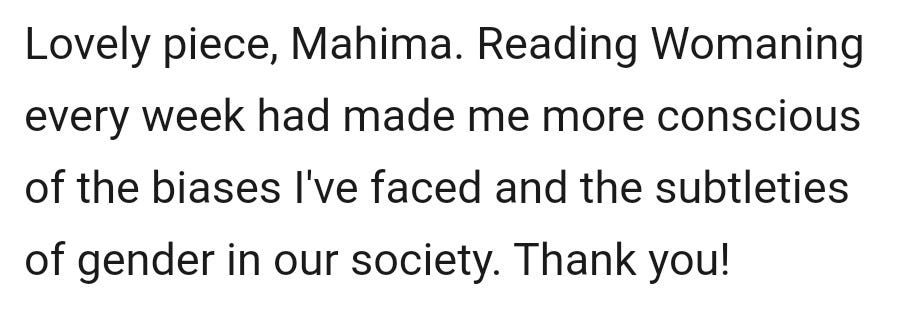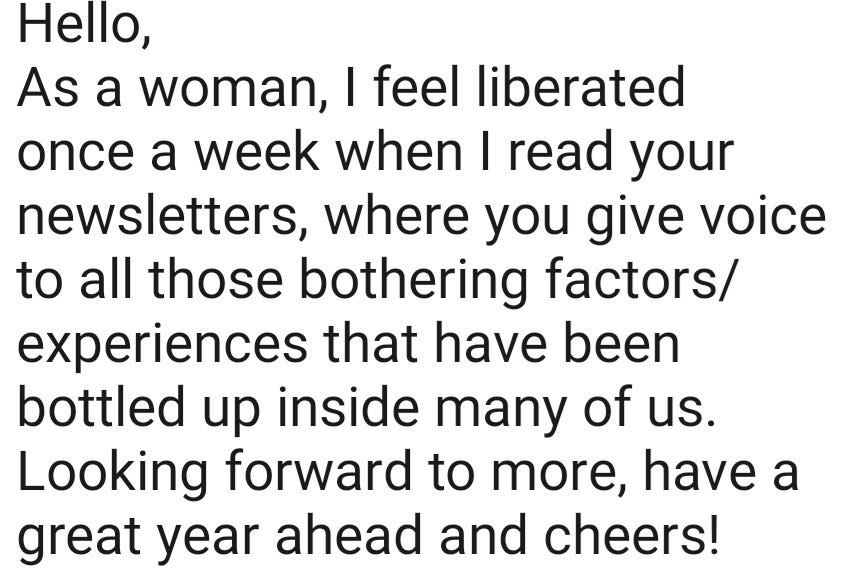Do women have the freedom of speech and expression online?
The Constitution guarantees it to all citizens. But most Indian families interpret it differently.
Hello ji,
One of the big lessons I have learned from writing this newsletter has been about privilege: The most insidious thing about privilege is that it blinds the person who enjoys it.
This is true of the man who does not realize what a privilege it is to simply step out of your home without looking at the time or your clothes.
This is also true of the person who proudly exclaims “I don’t even know my caste”, not realizing that being unaware of one's caste is an exclusive privilege enjoyed by upper castes in India.
And it is true of me - a woman, expressing her opinions, sharing her deepest darkest secrets and stories on the internet without, as they say, fear or favour. Mostly without fear.
I was made painfully aware of this privilege when a reader sent me this message last week:
Just to rub in the tragedy of this message, let us call the sender ‘Abhivyakti’, which means (freedom of) expression.
I know Abhivyakti personally. She is someone whose credentials - if you heard them - would undoubtedly qualify her in your mind as "a privileged elite woman".
And yet, here she is, texting me about how she looked at women who spoke freely on the internet - women like me, that is - wondering what our husbands thought about it.
I have been sharing my open, unadulterated, uncensored thoughts with you for over a year now. For this week's piece, I decided to drill down on Abhivyakti’s experience - one that I have been privileged enough to be blind to so far.
“One less thing to fight about with my husband”
Let me start with Abhivyakti’s own story. She says she has many inhibitions about what she can or cannot say on social media.
“I often feel the urge to post about gender inequalities - especially around gender roles in marriage. In the early years of my marriage, my husband would expect that I cook his every meal, even though I have an equally (perhaps more) stressful job. When I questioned his assumption that cooking / running the house is the woman’s responsibility, his response was, ‘My mom never complained that she had to cook for me, then what is your problem?’ It took a lot of years and a lot of arguments between us to make him realize that kitchen work is not easy (and that I am not his mother!) But even today, equality is far out of my reach.”
“Unfortunately, my husband is convinced that he ‘helps me’ a lot around the house. He does not realize that just using the term ‘help’ means that I am somehow responsible for all the housework, and his role is only limited to being an assistant when he wishes. He even thinks that I should be grateful for all his ‘help’ and all our family members agree with him.”
Abhivyakti feels like talking about these issues on social media, but can never muster the courage to do it.
“I know that if I did, my family would call it ‘unnecessary’ or ‘undignified’ and ask me to take it down. My husband would take it personally and pick a fight with me.”
She looks at other women who are vocal on social media with awe.
“Sometimes I see women talking about periods or sexuality - these are important conversations for generating awareness and removing the taboos associated with these topics. But I look at such women in wonder. If I did something similar, I am sure my husband would shout at me, and call me an attention seeker, or vulgar, or just cheap.”
“Fortunately, I don't have the confidence to post my opinions about such matters, so I have one less thing to fight about with my husband.”

“Fatima chachi kya kahengi?”
Nagma went to Dubai for further studies after her graduation. While she was there, she stayed with an aunt who was based in the city.
"Fatima chachi had suddenly become very religious and conservative in the last few years. She would show me women walking around fully covered in burqas and tell me to be more like them. She would tell me off if I stepped out of the house not fully covered from head to toe."
But Nagma, who grew up in Mumbai, had been used to wearing jeans, skirts, and shorts all her life.
"I did not argue with her, but I would wear whatever I wanted when she was not around. Sometimes, friends would take pictures and upload them. Sometimes, I would really like a particular pic of mine and use it as my WhatsApp display picture."
"Without fail, I would immediately get a call from my mom. She would say, 'We are forward thinking, but what will Fatima chachi say when she sees this photo? Please remove it.' My mother wasn't exaggerating either. My aunt would often call up my parents to complain about a dress I wore or a photo of mine she saw somewhere."
"And while my aunt was busy policing the length of my skirts, a male cousin of mine would openly upload shirtless pics of his all over the internet. No one ever said anything to him. In fact, he would get compliments like 'Kya body banayi hai!' (How fit he is!) I hated it but I had to remove or change so many DPs during those years, because 'Fatima chachi dekhengi toh kya kahengi?' (What would Fatima chachi say if she saw this?)"

“Instead of doing all this, she should focus on her child”
Sheetal has two cousins who run fitness pages on social media.
"One is a young male cousin here in India. Another is a female cousin who lives abroad and is also a mother."
A sidenote here from me: I have a ton of respect for mothers who have managed to focus on their fitness. It is far easier for young men - with their high metabolism and their moms cooking for them - to stay in shape. It is far, far tougher when you are a woman who is the caregiver for children (and usually many adults) and are struggling with a body that has been through pregnancy, childbirth, breastfeeding, and other motherhood ke side effects.
Sheetal's family, though, has a different take on the matter.
"Both these cousins share photos and stories on Instagram, and write motivational posts on fitness. But the way they are perceived is so different. Family elders will talk about my male cousin in voices dripping with pride - 'Kya body banayi hai, kitni acchi baatein karta hai' (How fit he is! What nice messages he shares!)”
“About the female cousin, they say things like 'Baahar reh rahi hai aur azaadi hai, toh kuch bhi kar rahi hai. Saas ke saath rehti toh pata chalta!' (She is taking advantage of the fact that she lives abroad. If her mother-in-law was around, she would have taught her a lesson.) And of course, 'Instead of doing all this, she should focus on her child' - the go-to comment used to pull a mother down for doing anything other than changing diapers."
“My picture would be analyzed instead of his behaviour”
When I first reached out to Alisha, I noticed there was no WhatsApp DP (display picture) on her account. For this piece, I asked if this was because she hadn't added my number yet, or if she did not have a DP at all.
"I have taken by DP off. A lot of delivery executives / bank people have access to this number. And sometimes I have to save theirs. If I put up a picture, and some one tried to cross a line, my picture would be analyzed instead of his behaviour. The first statement is always, 'Your picture must have been too forward, otherwise why would the man take such liberties?'."
My question also made Alisha recall the time she did have a DP.
"When I was dating my ex, I had used a picture of the two of us as my DP. We were hugging each other in the photo. My grandmom saw it and told me, 'It is okay that you can have a boyfriend. But don’t put up photos like this for everyone to see.' We were consenting adults in a loving relationship. Men share photos of their partners with pride. But when women do it, our character suddenly becomes fodder for public judgment."
“It is easier to keep this part of my life hidden"
Jonita has an ongoing disagreement with her family over her 'dress code'.
"My family has strong opinions on what is appropriate dressing for me, and what is not. It makes my life extremely claustrophobic. When I was younger, even a sleeveless shirt was not okay. When I moved away for college and then work, my clothes became out of sight and out of mind for them. But if they ever came across a photo of me wearing even a slightly revealing dress, it would become a serious family issue."
During the pandemic, Jonita moved back to her hometown.
"I am a 25-year-old, financially independent adult woman now. So I thought that I will dress however I want. But I was sorely mistaken. My clothes have become the epicenter of a lot of arguments and fights at home in the last year."
This might appear a frivolous subject to some - 'Why not just concede and wear what they say to keep the peace?'
But for Jonita, clothes are not "just clothes".
"I love my body, and I love my clothes. This acceptance for very hard for me to come by. I went through years of self-image and eating disorders before I learnt to love my body the way it is, and take pride in the clothes I wear."
No surprises then, that - much like many other Indian women - Jonita leads a double life online.
"I have not accepted follow requests from anyone in my family. They will never understand why what I wear is important to me, and the freedom to share myself the way I am is so precious. It is just easier to keep this part of my life hidden from them."
"We are understanding, but others are not"
Samyukta's family recently started looking for an arranged marriage match for her.
"A member of my extended family is trying to work with a marriage broker for me. He called my father one day and told him that there was 'an objectionable photo' of mine on the internet and that my father should make me take it down. My big crime was that I was wearing a crop-top in that photo. It made zero sense to me, but I deleted the photo just to avoid conflict.
That led to a deep cleaning exercise of Samyukta's entire social media presence.
"I had to remove pictures of me in revealing clothes, pictures with exes, anything with alcohol and cigarettes etc. He said, 'We might be understanding but other people are not'. It is a classic statement made by people to hide their own biases. They think women should all be sati savitris, at least in the public eye - even if it does not match their reality."
Samyukta has a younger brother who is equally active on social media.
"My brother's posts and photos have never been questioned. A boy is, of course, expected to have lived a full life, to have friends, to party, to have girl friends. But God forbid a girl tries to live half that life!"
"Accha nahi lagta"
Samaira has been in therapy for some years now.
"My family was not aware of my mental health issues. One day, I decided to post on insta about how helpful therapy has been for me, and how happy I am that I decided to go. It was a big step for me to come out in public with this statement. I also hoped that my story would inspire others around me who were struggling to seek help as well."
A family friend saw Samaira's post and told her mom about it.
"At first, my mom was very sweet about it, and asked if I'm ok, etc. But she also said, 'Others won't understand it, delete the post, accha nahi lagta (it doesn't look nice)'. I ended up deleting the post."
“Apparently I can do nothing right on social media”
Latika loved putting up her pictures on social media.
"Orkut was new in India when I was in college. I created an account and uploaded a profile picture on it. Quite ordinary - it was just a photo of me taken on campus. I was wearing my favourite top which had butterflies on it, and matched it with my favourite oxidized metal earrings. Overall, I thought it was a nice photo."
The next day, when Latika walked into the lecture hall, she found her male classmates buzzing with comments about the photo.
"They were intentionally having loud conversations about it in my vicinity. I could hear comments like, 'earrings to nakli lag rahe the' (those earrings look fake), 'butterfly kahaan se aai?' (Where did the butterfly come from?), and 'chashme kyu nahi nikale?' (Why didn't she remove her glasses to take the pic?).”
“In those days, this used to be called 'eve teasing'. It gave the whole thing a friendly-ribbing kind of tone. But there was nothing friendly about this. Most of these guys had never had the guts to even speak to me directly. But now they felt free to discuss my image within my earshot. The message was clear - 'We are watching you. We will analyse your every activity on social media. And everything you put out there is fair game for us to pass comments on. Or worse.' I remembered that earlier that year, some boys had taken prints of private photos of some girls and stuck them up on the walls all over college. No one had taken any action against the boys, but the girls became the laughing stock of campus."
Latika was terrified by the thought that something like that could happen to her.
"I went back and changed my photo immediately. I uploaded a generic stock photo of a cute baby. The next day, I heard comments like 'Ye lo, isko toh abhi se baccha chahiye!' (Look, she wants a baby already.) I realized that when I am surrounded by men who are capable of somehow sexualizing even stock images of babies, I had no business having an online presence at all."
That was 20 years ago. To this day, Latika has not posted a single image of herself online.
"I became extremely camera conscious and wary of any images of mine being put up online. What is a fun distraction for most people is my personal paranoia. I remember, a few years back, a colleague posted pictures of an official trip on his Facebook page. I was just in a group picture, but I flipped out about it, and made him take it down. Now I feel bad for the poor guy, who had no idea why I was reacting this way."
But each time she has tried to step over the line, she has been reminded that it is not her place.
"When I became a new mother, I posted a photo of my baby on the family WhatsApp group. Immediately, my mother-in-law called me and demanded I take it down because 'nazar lag jayegi' (to protect the baby from the evil eye). I gave up completely at that point because apparently I can do nothing right on social media.”
“Ironically, I spend a lot of time on social media - I watch what others post, I see them uploading happy pictures, sharing personal and professional milestones. I have come to the conclusion that social media might be fun for others, but I just don't have a place on it."
"Is this what my parents really think of me?"
After she graduated, Shravanti moved away from her small hometown to Bangalore for work.
"A few years later, I ran into a college junior at a mall. We ended up chatting for a while and decided to have dinner together. We talked about his new job, how he was adjusting to living in a big city, etc. He was anxious about all of it and I gave him some friendly advice. It was a really nice evening. After dinner, we were joined by his flatmates. We took some photos together, and went our ways."
"That night, he uploaded one of the pics on Facebook, and attached a heartfelt message. He wrote about how grateful he was for my counsel, how lucky he felt that he ran into me, and what a lovely evening we had together. Harmless stuff, quite sweet actually. Or so I thought."
The next day, Shravanti woke up to her phone ringing non-stop.
"It was my parents. They had seen the post and were livid. My father started shouting, 'Who is this boy? What will your uncle (my dad's elder brother) think if he sees your shameless behaviour?' My mother was crying. They asked if this is what I aimed for when I took up the job in Bangalore - the freedom to sleep around with the entire town. They called me a slut who hung around with boys late in the night."
"I was shocked. I knew my parents were conservative, but I had done nothing wrong here. If a junior of my brother's had written such a glowing post about him, they would have showed it to the entire family with pride. If the junior had been a girl, they might even have teased him. I wept on the call, and for days after that."
Shravanti also had to make the embarrassing call to her junior, asking him to take the post down.
"Making that call was mortifying. But it was nothing compared to the memory of the things my parents said to me that day. It made me wonder if this is what my parents really think of me. I have spent an entire life being a model daughter - I was a grade A student, I got admission into a premier college, I got a job at one of the best IT firms in the country, I earn more than any boy my age from our community. I don't smoke, I don't drink, I don't even date. I do everything I can to not break my parents’ trust. I live by their values, even when I don’t agree with them.”
“None of this seemed to matter to them in that moment. All it took was one Facebook photo for my own parents to call me a 'slut' without a moment's hesitation. How can you expect women to actually speak freely or be themselves on social media when we are reminded everyday that we have no right to a voice or a presence beyond society’s arbitrarily defined lakshman rekha (line of control)?”
Article 19(1) (a) of the Constitution of India states that “all citizens shall have the right to freedom of speech and expression”.
But here is what they don’t teach you at school - that the fine print under this says:
“Applicable only to women who will express themselves fully clothed from head to toe in culturally appropriate clothing, after due approval from mother, father, uncle, aunt, family friend, friend of friend, male classmates, the street dog, local panwadi, and all other self-appointed protectors of Indian culture and virtue. Also applicable to women who want to share virtuous opinions about subjects like the glory of God and the greatness of our holy motherland. Oh, and also applicable to men. All men.”
PS: Something cool happened this week
Here is an example of what happens when women speak freely on the internet (as if we need a reason):
Womaning in India got nominated this week for Women’s Web 2022 Awards for digital creators in India.
Not an award, but still - yay!
The nomination is very cool, no doubt about it. But it also made me reflect on what is my biggest compensation from Womaning. Turns out, it is the messages I get from all of you wonderful people about how you personally connect to the issues I write about.
Sharing some of them from just the last week here:
These are just 5 of the hundreds of messages I have received from you over the last year. And that, to me, is so much bigger than any award.
Lou is coming.
Mahima
❤️ Love Womaning? Show it by becoming a paid subscriber or getting yourself some choice Womaning merch.
🔥 If you are an aspiring writer - or even someone who just wants to make their emails shine - check out my storytelling course, which includes writing workshops and one-on-one mentoring to help you write better, write consistently, and launch your own newsletter.















My wife would probably have told you what abhivyakti did. Men (may I say 80s kids) were conditioned directly or indirectly to have their moms' cooking and caring while dads earned. My mom earned too. She cared not just for us for but the extended family. Elders I met in the extended family would gush at how wonderful my mother was caring for her husbands parents and grandparents and even his brothers, all the while teaching high school kids physics. I knew it wasn't right. But when I got married, I thought I carried a lot of that subconsciously. I would help. but it was only help. Constant dialogues. fights. disagreements. And maybe now I see things differently, I'd like to believe. I still get knocked down for not doing enough dishes. But I also get more leeway because I think she sees that there is a lot more respect. Almost 2 decades later, maybe I have changed - a little.
Kudos to you for deliberating over a seemingly innocuous aspect of women's lives. Some people might even find this frivolous. But such a constant judgmental gaze will definitely shape every other area of a woman's life - her values, her thought process, etc. - and in ways that are impossible to measure.
Showcasing specific instances (vs. vague generalizations), does not only make this post easily relatable for women, but also helps men become aware of such biases they might (most likely) be harbouring - consciously or otherwise.